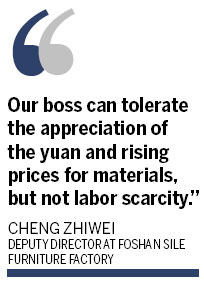|
In the administration building at the Foshan Sile Furniture Factory in the town of Lecong, around 60 workers recently waited in a corridor for their free train tickets to go home and visit their families during the Spring Festival.
After one of the workers, Xu Honglou, showed his identification at the accounting office to get his ticket, a manager from the worker management department stopped him for a chat, as he had with countless other workers that day.
Quietly, the manager promised 26-year-old Xu a hefty commission if he could persuade young adults from his hometown in the neighboring province of Jiangxi to join the factory: 300 yuan ($46) per man and 200 yuan per woman if they sign a one-year contract. Xu was then given 600 yuan and a dozen hats embroidered with the factory logo to be used in his recruitment attempts.
Conversations like the chat between Xu and the manager have recently been turning into a common sight at the factory and throughout Lecong, where the decreasing number of available workers has subtly changed the relationship between employers and workers. Many workers that China Daily spoke to said factory owners are now more generous in their treatment of employees, mostly to encourage them to return to their jobs after a holiday season.

"Some factories even offer 500 yuan per person for recruiting new members," Xu said. "Many workers in my factory will not return to their posts even though they asked the factory to pay their fares. Management is aware of this situation."
In 2007, there were around 167,000 migrant workers employed at manufacturing factories in Lecong. According to the Shunde chamber of commerce, the number of workers dropped, beginning in 2009, when many workers chose to stay in their home provinces to find a job using the skills they learned in Lecong.
Today, the town has 100,000 residents and a migrant population of 130,000, most of whom are working in factories in Lecong.
The town is a major furniture, steel and ceramics manufacturing hub in Shunde district in the city of Foshan on China's southern coast. But the recent shortage of labor is bleak, as evidenced by the numerous signs saying "Workers Wanted" in the windows of stores, factories and companies in its main thoroughfares.
A decade ago, workers from beyond the province of Guangdong flocked to Lecong after thousands of factories were built. But now, with more inland provinces such as Sichuan and Hubei offering higher wages and opportunities, the flow of labor to Lecong and to Guangdong has slowed down considerably.
In January, the Foxconn Technology Group, a major manufacturer of electronics parts, announced a plan to recruit 30,000 workers in Hubei province after the Spring Festival. It also offered higher wages, the National Business Daily reported. The company said it would offer a monthly salary as high as 2,800 yuan to common workers, much higher than the average monthly salary of 1,400 and 1,800 yuan in Lecong.
Lecong is also beset with heavy air pollution, rising prices and heavy traffic congestion, factors that work against attracting young adults from inland provinces.
In 2010, 18,150 vacancies in production jobs and 8,793 vacant technical jobs were unfilled in the town. The employment outlook this year will again be dire in Lecong, especially for its manufacturing industry, according to the Shunde chamber of commerce.
According to workers and the chamber, factory bosses are realizing that they have to spend more money and improve living conditions for employees, although they still are fairly reluctant to do so.
The factory Xu worked in 2009 started buying pension insurance for senior technicians who have been at the factory for five years or more. Every contract employee has full healthcare coverage.
Cheng Zhiwei, deputy director at Foshan Sile Furniture Factory, said more sport facilities will be purchased. Management is also planning to furnish individual rooms for married couples.
"Our boss can tolerate the appreciation of the yuan and rising prices for materials, but not labor scarcity. We urgently need porters, welders and lorry distributors," he said.
But many young adults who were born in the 1980s and 1990s, toiling at factories far away from their homes isn't cutting it. Many told China Daily that they want to earn substantial money, learn new skills and accumulate social skills and knowledge. A heavy job, they said, isn't ideal.
"Business owners are anxious and cannot afford to lose workers, which could directly shut their plants down or delay production," said Chen Chaoyi, secretary-general of the Shunde Furniture Association.
China Daily
|